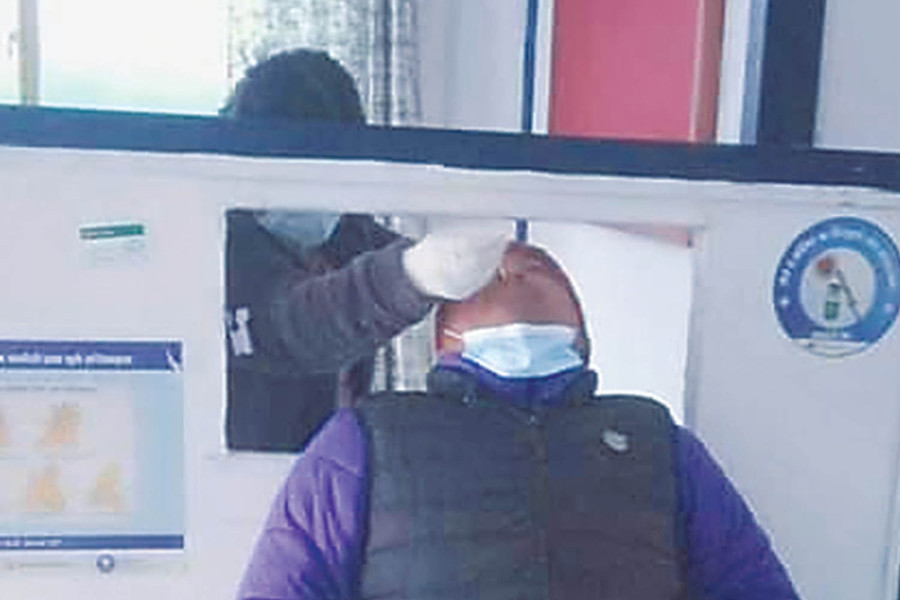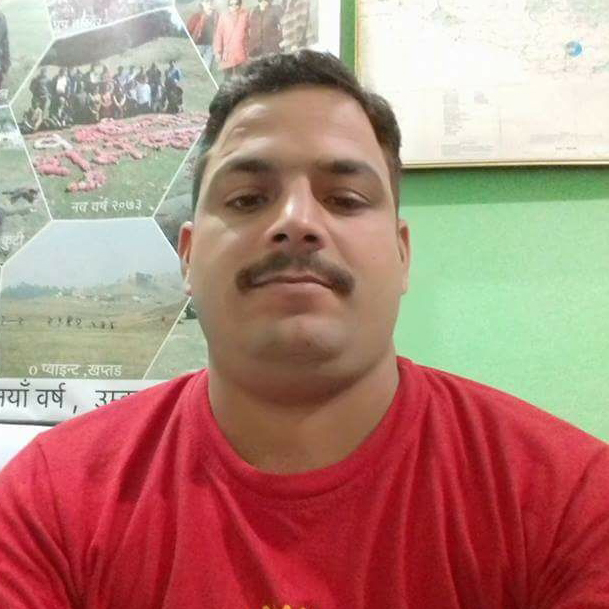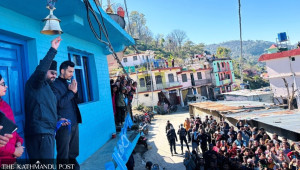Sudurpaschim Province
Health workers manning Covid desks on Nepal-India border unpaid for six months
Amidst the increased workload and health risk following a resurgence of coronavirus cases, the health workers feel cheated.
Bhawani Bhatta
The health workers manning the health desks at border points across Sudurpaschim province have not been paid their salaries for the last six months. Amidst the increased workload and health risk given the resurgence of coronavirus cases, the employees feel cheated by the government.
The Gaddachauki border point in Kanchanpur reinforced testing for coronavirus among those crossing into Nepal from India through the border point last month in light of reports of the spread of coronavirus infections in India.
On Tuesday, two people returning from India tested positive for coronavirus in an antigen test at the Gaddachauki border point. The Ministry of Health and Population has instructed the health desks to tighten border crossings to stop the spread of the new variant JN.1 seen in India and also in Nepal.
The ministry issued a notice to increase surveillance at border checkpoints and to follow safety standards. However, the health desks are short on manpower and those who are working have not received their salaries since July last year.
According to Prem Singh Bhandari, in charge of the health desk in Gaddachauki, currently there are 12 health workers at the desk and they are in need of additional manpower.
“We are working extra hours without additional manpower, but we still have not received our salaries for six months,” said Bhandari. “Every health worker here is going through financial problems and facing difficulties to manage their daily expenses. Now the government expects us to work longer hours without pay.”
As of Tuesday, 12 people crossing into Nepal through the Gaddachauki border point tested positive in antigen tests for coronavirus.
Ganesh Saud, the in-charge of the health desk in Gauriphanta, two people entering Nepal through the Gauriphanta checkpoint tested positive in antigen tests for coronavirus on Tuesday.
“There are 11 health workers at the Gauriphanta border point. Among those crossing into Nepal, at least one or two have been testing positive for coronavirus daily. The risks have increased for us but the government has yet to pay us our salaries,” said Saud. “The health directorate of Sudurpaschim province said that they don’t have the budget to pay us. They said the Ministry of Health and Population and the Department of Health Services have not sent the budget to the directorate to pay our salaries.”
Around 600 people enter Nepal from Gaddachauki and Gauriphanta border points daily.
According to Saud, in the third week of December nine people returning home from Delhi, Bangalore and Chandigarh tested positive for coronavirus. Their swab samples were sent to the National Public Health Laboratory, Kathmandu, for testing.
Saud said that according to the report of the National Public Health Laboratory, BA.1 and BA.2 variants of Omicron were found in the samples sent from the Gauriphanta border point. “At least 25 to 30 people are tested daily for Covid using antigen tests,” said Saud.
Health desks have been set up in four places in the Sudurpaschim Province—Gauriphanta in Kailali, Gaddachauki in Kanchanpur, Jhulaghat in Baitadi, and one in Darchula. Although the health desks were established by the local units, the Department of Health Services has been managing the staff and their salaries.
Hemraj Joshi, the Covid focal person of the Provincial Health Directorate, said that they have not been able to pay the salaries of the health workers due to a lack of budget.
According to Joshi, 27 health workers are working on a contract basis at the four health desks of Sudurpaschim.
“Last year, a budget of Rs11.8 million was allocated for the directorate by the department, but this year only Rs1.8 million was allocated,” said Joshi. “None of the health workers have received their salaries since July.”
According to the Ministry of Health and Population, 16 samples of different age groups collected from different areas were tested on January 7, and seven samples were found to have Omicron's sub-variant JN.1. Due to the outbreak of the new variant, the ministry has been notified to increase testing at the border checkpoints and has also informed the health workers to stay prepared if the situation gets out of control.
The World Health Organisation classifies JN.1 as a separate ‘variant of interest’ given its rapid spread around the globe. The UN health body, however, said that based on available data, “the additional public health risk posed by JN.1 is currently evaluated as low”.
Several countries, including China, Indonesia, the Philippines, Malaysia and Singapore, have reported upticks in new coronavirus cases. The JN.1 strain, first detected in September in the United States, is a descendant of BA.2.86, a highly-mutated variant of the Omicron strain of the coronavirus.




 10.12°C Kathmandu
10.12°C Kathmandu















